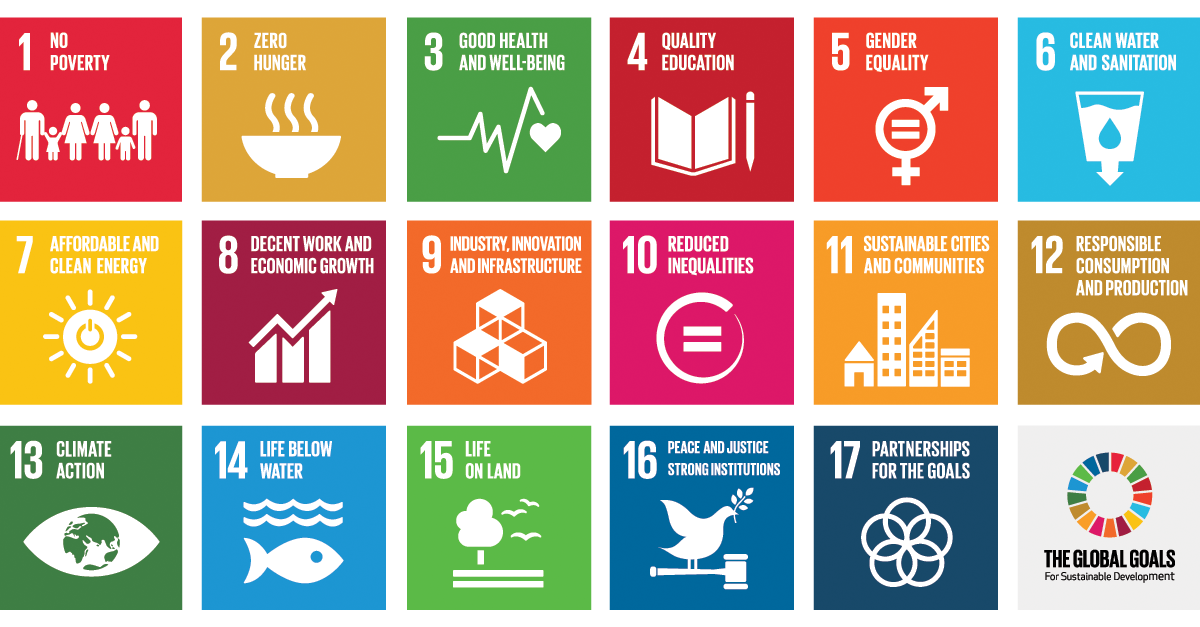SUSTAINABLE DEVELOPMENT GOALS
The first definition of sustainable development comes from the Brundtland Report(1987) where it was described as "development which meets the needs of current generations without compromising the ability of future generations to meet their own needs".
 The UN General Assembly in September 2015 adopted a global development vision called Transforming our World: The 2030 Agenda for Sustainable Development. The 2030 Agenda is "a plan of action for people, planet, and prosperity".As part of this agenda, 17 new Sustainable Development Goals(SDGs) and 169 targets to stimulate global action over the next 15 years on issues critical to humanity and the planet have been identified by the global community. The concept of SDGs was born at the United Nations Conference on Sustainable Development, Rio + 20, in 2012.
The UN General Assembly in September 2015 adopted a global development vision called Transforming our World: The 2030 Agenda for Sustainable Development. The 2030 Agenda is "a plan of action for people, planet, and prosperity".As part of this agenda, 17 new Sustainable Development Goals(SDGs) and 169 targets to stimulate global action over the next 15 years on issues critical to humanity and the planet have been identified by the global community. The concept of SDGs was born at the United Nations Conference on Sustainable Development, Rio + 20, in 2012.
In the September 2015 UN Summit, the Prime Minister of India pledged its commitment to the SDGs.The SDGs officially came into force from 1st January 2016. NITI Aayog has been assigned the role of developing national indicators, overseeing the implementation by ministries and coordinate with States for the achievement of development targets as enshrined in the SDGs.
The interlinkages and integrated nature of the Sustainable Development Goals are of crucial importance in ensuring that the purpose of the new Agenda is realized. Goals and targets will stimulate action over the next fifteen years in areas of critical importance for humanity and the planet.
The 2030 agenda now proposes a holistic approach to develop strategies and calls for pursuing all dimensions of sustainable development in a balanced and integrated way. The new agenda goes beyond the traditional three dimensions of sustainable development and is grounded in 5 "Ps":
17 nos of SDG 'S are:
SDG.4: QUALITY EDUCATION: Ensure inclusive and equitable quality education and promote lifelong learning opportunities for all.
TARGETS
4.1
By 2030, ensure that all girls and boys complete free, equitable and quality primary and secondary education leading to relevant and effective learning outcomes.
4.2
By 2030, ensure that all girls and boys complete free, equitable and quality primary and secondary education leading to relevant and effective learning outcomes.
4.3
By 2030, ensure that all girls and boys have access to quality early childhood development, care and pre - primary education so that they are ready for primary education.
4.4
By 2030, ensure equal access for all women and men to affordable and quality technical, vocational and tertiary education, including university.
4.5
By 2030, eliminate gender disparities in education and ensure equal access to all levels of education and vocational training for the vulnerable, including persons with disabilities, indigenous peoples and children in vulnerable situations.
4.6
By 2030, ensure that all youth and a substantial proportion of adults, both men and women, achieve literacy and numeracy.
4.7
By 2030, ensure that all learners acquire the knowledge and skills needed to promote sustainable development, including, among others, through education for sustainable development and sustainable lifestyles, human rights, gender equality, promotion of a culture of peace and non - violence, global citizenship and appreciation of cultural diversity and of culture 's contribution to sustainable development .
4. a
Build and upgrade education facilities that are child, disability and gender sensitive and provide safe, non - violent, inclusive and effective learning environments for all.
4. b
By 2020, substantially expand globally the number of scholarships available to developing countries, in particular, least developed countries, small island developing States and African countries, for enrolment in higher education, including vocational training and information and communications technology, technical, engineering and scientific programs, in developed countries and other developing countries.
4. c
By 2030, substantially increase the supply of qualified teachers, including through international cooperation for teacher training in developing countries, especially least developed countries and small island developing States.
Government of Assam has demonstrated leadership as the front runner in the country by preparing the Vision 2030 document in light of the SDGs.Government of Assam has taken concrete steps to move towards this vision and has followed the much-recommended whole of the government approach in preparing for the implementation of the SDGs.
Assam is one of the first states in India and globally to start bringing SDGs into the policy discourse of the state. Under Goal 4 of SDGs, the Department of Education, Government of Assam set a vision - “All Children in School and Learning with Quality within and outside School” to address the challenges, the state of Assam is facing in education sector, and moving towards achieving universal access to inclusive and quality education from pre-primary to higher education and achieving the target of goal-4 of the SDG in state-specific context.

Initiatives undertaken so far-
Prepared draft Template for developing a strategy plan for SDGs.
Prepared 7-year Strategy Paper and 3-year Action Plan (SPAP) on SDG-4( School Education) and submitted to the Deptt. of Elementary Education to the Govt. of Assam.
Conducted several rounds of discussion and meeting with Directorates, line Deptts. UNICEF etc. for preparation and implementation of SDG.
Coordination with the Centre for Sustainable Development Goal for various matters.
Linking up of interventions with targets of SDG.
Preparation of detailed agenda, brochure, themes & formation of groups of SDG conclave organized on 16th & 17th June 2017.
Organization of Conclave on 16th & 17th June 2017 for finalization of draft 7-year Strategy Paper and 3-year Action Plan (SPAP) for achieving SDG in-collaboration with Education Department, UNICEF & SDG Centre, Assam. Expert and participants from various Department/Organisation were invited for the conclave.
Draft 7-year Strategy Paper and 3-year Action Plan (SPAP) is being prepared as per the recommendation of participants of the conclave.
| Title | Size | Detail |
|---|---|---|
| ASSAM AGENDA 2030.pdf | 19.82 MB |
